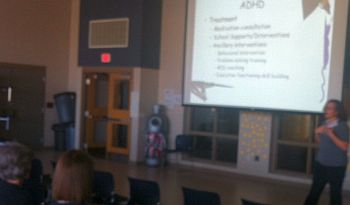 03/19/12 Parents and other caregivers of children displaying behaviors common to a diagnosis of ADHD (Attention Deficit Hyperactivity Disorder) were given an opportunity to attend a presentation the topic and have many of their questions answered on March 13. Dr. Carrie Cadwell shared her expertise on the topic in the second of a series at Menominee Elementary for the community.
03/19/12 Parents and other caregivers of children displaying behaviors common to a diagnosis of ADHD (Attention Deficit Hyperactivity Disorder) were given an opportunity to attend a presentation the topic and have many of their questions answered on March 13. Dr. Carrie Cadwell shared her expertise on the topic in the second of a series at Menominee Elementary for the community.
Cadwell said common symptoms of ADHD often include making careless mistakes, showing poor sustained attention, not listening , having poor follow through, avoiding/dislikes activities with high sustained attention demands, is disorganized, loses things, is distractible, and forgetful.
 Cadwell said, “Parents feel ill-equipped to help their child and they need information.” She pointed out that some children display symptoms prior to age seven, some after age seven and others do not show symptoms until adolescence.
Cadwell said, “Parents feel ill-equipped to help their child and they need information.” She pointed out that some children display symptoms prior to age seven, some after age seven and others do not show symptoms until adolescence.
She also cautioned that not all behavior problems mean that a child has ADHD. She said, “Boys, 60-70 percent of them, will show behaviors that are typical, not necessarily ADHD, so you have to be careful to not identify incorrectly especially since boys tend to get diagnosed more than girls.”
Cadwell stressed the need for directing the attention of a child with ADHD symptoms. She said, “The key is to pre-plan and rehearse it.”
She said, “Feedback after misbehavior is not as effective in changing behavior as feed-forward/feed-back with practice of positive behavior.” She also suggested giving a heavy emphasis on “caught ya’s” when children are displaying appropriate behaviors. “Research suggests that both classrooms and home environments are often low on positive reinforcement although we tend to think we do great .” she said.
 ADHD behaviors in the classroom often lead to frustrations for both parents and teachers. Cadwell said, “Teachers are not looking to usurp your parental control, but are looking for ways to support your child.” She added, “Rules need to be stated positively and clearly.” She said, “They need to set expectations early and revisit them as needed.”
ADHD behaviors in the classroom often lead to frustrations for both parents and teachers. Cadwell said, “Teachers are not looking to usurp your parental control, but are looking for ways to support your child.” She added, “Rules need to be stated positively and clearly.” She said, “They need to set expectations early and revisit them as needed.”
She also said that there are unsuccessful strategies at home or school such as the use of ignoring in isolation or punitive/harsh punishments.” She said, “We think we are “sending a message”, but its fleeting.”
Dr. Cadwell practicing in Plymouth at the Cadwell Psychological services, LLC. Her next presentation will be on the topic of autism on April 5. April is national autism awareness month.
Carol Anders Correspondent














